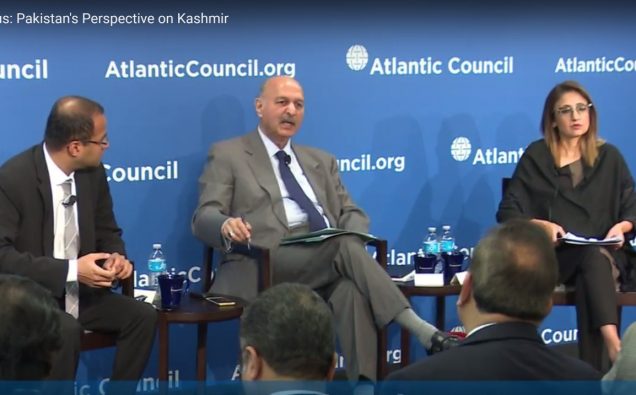
A top Pakistani senator, Mushahid Hussain Sayed, Wednesday outlined a range of reasons to South Asia watchers as being imperatives for New Delhi making peace with Pakistan through a fair settlement of Jammu and Kashmir dispute.
“The biggest incentive is that failure to resolve Kashmir and improve relations with Pakistan is the single biggest obstacle to peace, security and stability in South Asia,” Sayed told a gathering of experts, diplomats and academia at the Atlantic Council.
Sayed, who is in Washington along with Member National Assembly Shezra Mansab Khan, as Pakistani Prime Minister’s Special Envoys at a time of heightened South Asian tensions over Kashmir, also explained how failure to address the longstanding dispute is hampering India’s advancement.
“It is an impediment to India’s rise. It’s an impediment to India’s economic development.”
The senator also offered some specific examples to reinforce his argument:
“If Kashmir had been solved, Shashi Tharoor (an Indian diplomat)would have been the secretary general of the UN.
“If Kashmir had been resolved, India would have been in the Nuclear Suppliers Group.
“If Kashmir had been resolved, India would have been a member of the UN Security Council (with a) permanent seat.
“But as long as you have dispute with neighbors, you have a lingering dispute under United Nations, which you have promised to implement, and you are not implementing them for expediency reasons, you cannot be at the high table in the world of global politics.”
Despite some gestures by Pakistani Prime Minister Nawaz Sharif and his Indian counterpart Narendra Modi in the last couple of years, peace dialogue between the two nuclear-armed neighbors remains suspended.
Recent upsurge in violence in Indian controlled Kashmir -Indian security forces’ killing of around 100 Kashmiri civilians protesting New Delhi’s repression and an attack on Indian military base in Uri – have further exacerbated tensions in the region.
Islamabad and New Delhi accuse each other of perpetrating terrorism in the region of high-stakes interest to the United States.
For its part, Washington has asked both neighbors to show restraint and hold talks to resolve their disputes and differences.











